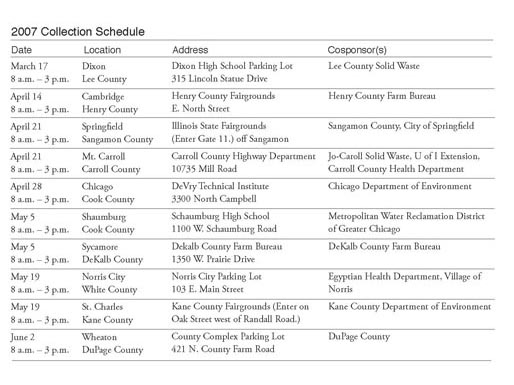|
Spring is finally here, and with it comes spring cleaning. It’s a good time of year to sort through all you’ve accumulated and evaluate the need of those items. Some of those items may include pesticides and various other chemicals. Does the half-full gallon of nearly neon green paint sitting in your garage come to mind? Painting the nursery bright (blinding) green sounded like a good idea at the time! Perhaps it’s the cylinder of fungicide powder you bought to treat the black spot on your roses. Over the years, the black spot problems passed—as did your roses. Of course, it’s best to prevent storing excess pesticides simply by buying smaller containers. Buy only what you need for the season. Unlike fine wine, pesticides don’t get better with age. Many tend to lose their effectiveness after a few years. However, prevention won’t solve your current overstocked situation. Fortunately, you have a few options for disposing of your old, unwanted pesticides.
- Use them up. You can usually apply them to a labeled-use site regardless of whether pests are present or not. Be sure to read and follow all label directions. Sometimes pesticides are taken off the market, or certain uses are removed from the label. In those cases, existing stocks can typically still be used. Rarely does U.S. EPA order a stop-use on the product. For example, it is illegal to apply old stocks of chlordane or 2,4,5-T. To learn about the registration status of your product in question, you can contact the manufacturer or the Illinois Department of Agriculture, (217)785-2427.
- Give them away. Fellow neighboring gardeners may be interested in your castoffs. It’s not recommended that you sell unwanted pesticides. To sell a pesticide legally, if must still be in the original packaging with the complete label. If the pesticide is restricted use, you must be licensed in order to sell it. If the product registration has been cancelled, selling is illegal.
- Take them to a hazardous waste collection event. The Illinois Environmental Protection Agency (IEPA) has scheduled 10 household hazardous waste (HHW) collection events to be held across Illinois this spring.
The Illinois Poison Center’s Web site (http://www.mchc.org/ipc/) has the following list of what is and is not accepted at a collection site. Use this list as a guide, but it may be best to call first if in doubt. Generally, chemical waste has packaging that contains the words “danger,” “toxic,” “flammable,” “corrosive,” and/or “reactive.” Please note that fungicides and insecticides are considered to be garden/lawn chemicals. They were likely listed separately in the table for clarification. Likewise, herbicides (including crabgrass preventers) must have been overlooked, but I’m certain they are accepted at HHWs as well. Materials ACCEPTED at HHW collections:
- oil-based paint
- solvents
- old prescriptions
- motor oil
- household cleaners
- household batteries
- antifreeze
- pool chemicals
- asbestos
- garden/law chemicals
- old gasoline
- fungicides
- metal polishes
- paint remover
- insecticides
- drain cleaner
- aerosol products
- hobby chemicals
- mercury (including thermometers and thermostats)
Materials NOT ACCEPTED at HHW collections:
- business wastes
- tires
- propane tanks
- explosives/ammunition
- fire extinguishers
- lead-acid batteries
- latex paint
- agricultural chemicals
- fireworks
- smoke detectors
- medical wastes

There are special hazardous material collection events for other nonhousehold types of pesticides:
- Agricultural pesticides are collected at various scheduled “Agricultural Pesticide Clean Sweep” events. Contact the Illinois Department of Agriculture, (217)785-2427, for more information.
- Structural pesticides (those used by professional applicators to control pests in and around structures) are collected at “Structural Pesticide Clean Sweep” sites. Contact the Illinois Department of Public Health, (217)782-4674, for more information.
|
